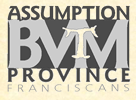US Catholic Bishops Responding to Presidential Election and the Freedom of Choice Act
 In their semi-annual meeting earlier this month in Baltimore, MD, the US Catholic Bishops had to confront an unsettling reality -- the election to the presidency of the United States of America of a man who has consistently supported abortion rights for women.
In their semi-annual meeting earlier this month in Baltimore, MD, the US Catholic Bishops had to confront an unsettling reality -- the election to the presidency of the United States of America of a man who has consistently supported abortion rights for women.
US Catholic Bishops at their semiannual meeting in November 2008 at Baltimore, MD
While acknowledging the landmark election of the first African-American man as president and, it might be added, the first president to NOT have a European surname, the challenge the US Catholic bishops perceived was responding to the new president-elect's campaign promise to sign into law the Freedom of Choice Act (FOCA). This piece of legislation would, in effect, roll back any federal restrictions to the availability of legalized abortion in this country that the sitting President G.W. Bush had put into place earlier in his term.
Francis Cardinal George (on right), Archbishop of Chicago and current president of the United States Conference of Catholic Bishops (USCCB), together with brother bishops, drafted a strongly worded response to the proposed Freedom of Choice Act.
He stated at the bishops' meeting that Roe v. Wade was a "bad court decision" and expressed concern that FOCA would ". . . deprive the American people in all 50 States of the freedom they now have to enact modest restraints and regulations on the abortion industry." He pressed on and said, "FOCA would coerce all Americans into subsidizing and promoting abortion with their dollars. It would counteract any and all sincere efforts by government and others of good will to reudce the number of abortions in our country. Parently notification and nformed consent precautions would be outlawed, as would laws banning porcedures such as partial-birth abortion and protecting infants born alive after a failed abortion. Abortion clinics would be deregulated. The Hyde Amendment restricting the federal funding of abortions would be abrogated. FOCA would have lethal consequences for prenatal human life." President-elect Barack Obama and Vice-President-elect Joseph Biden , Democrats. Both consider themselves "pro-choice" regarding the availability of legalized abortion. Joseph Biden considers himself a Catholic in good standing, is originally from Scranton, PA and the now-former senior Senator of the State of Delaware.
President-elect Barack Obama and Vice-President-elect Joseph Biden , Democrats. Both consider themselves "pro-choice" regarding the availability of legalized abortion. Joseph Biden considers himself a Catholic in good standing, is originally from Scranton, PA and the now-former senior Senator of the State of Delaware.
Among the painful realities that the US Catholic bishops must confront is their own "house cleaning" and the ongoing struggles pertaining to the 2002 fallout of the sexual abuse crisis. The cases don't disappear. In fact, arch/dioceses are still reeling from the effects of the sexual abuse crisis of minors. Some have already declared bankruptcy as a result of inability to pay the lawsuits. So, while the bishops rightfully decry abortion on demand, their own credibility -- by their own admission, by the way -- has been sorely compromised.
What are the bishops to do? What are we, as Catholics, to do? First, it would seem prudent and just plain smart to admit to the past failures and seek to make as much restitution as possible. This does not diminish the bishops' teaching authority as successors to the Apostles. In fact, it might really augment it.
We, as Catholics, are called upon to pray for our bishops. They are the successors of the Apostles. St. Francis of Assisi, in the Rule of 1223, writes, "The brothers may not preach in the diocese of any bishop when he has opposed their doing so." Yes, we obey our bishops. We also encourage them to "come clean" -- out of support for them and their office as teachers of the local Churches.
Unlike our more secular society, the teaching credibility of the US Catholic bishops doesn't come from popularity. Rather, it comes from their succession to the Apostles and their communion with one another, with the Pope and with the entirety of our Tradition.
However, the bishops are not limited to dealing only with Catholics -- being public figures, they also must contend with the reality of a much broader world. They are legally responsible and accountable, as well as ethically so, to secular society. This is not such a bad thing, although it may be uncomfortable. It may be truly a moment of grace for greater authenticity -- on the part of us all.


No comments:
Post a Comment